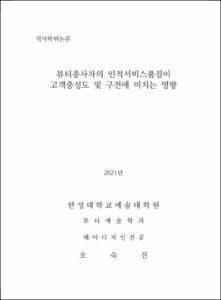뷰티종사자의 인적서비스품질이 고객충성도 및 구전에 미치는 영향
= How the Beauty Industry Workers’ Quality of Service Influences Customer Loyalty and Word of Mouth
- Files in This Item:
-
-
Download
 200000361165.pdf
기타 데이터 / 807.19 kB / Adobe PDF
200000361165.pdf
기타 데이터 / 807.19 kB / Adobe PDF
-
Items in Repository are protected by copyright, with all rights reserved, unless otherwise indicated.